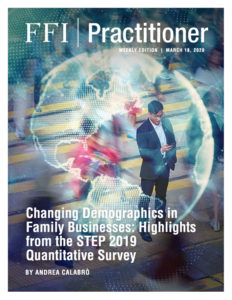
View this edition in our enhanced digital edition format with supporting visual insight and information.
Thanks to this week’s contributor, Andrea Calabrò, for summarizing the findings of the STEP 2019 Global Family Business Survey, which was introduced in the January 8 FFI Practitioner edition about applied research in the field. This study examined over 1,800 global family business leaders’ views on how increasing demographic and societal changes could impact succession planning and governance in family enterprises.
More than half of global family CEOs do not have a formal retirement plan and 70% of global family businesses do not have a formal succession plan, according to the STEP 2019 Global Family Business Survey,1 the impact of changing demographics on family business succession planning and governance. However, the report finds that Millennial CEOs are ready to take over.
With over 1,800+ family business leaders from all over the world sharing their views on increasing demographic and societal changes, the STEP 2019 Global Family Business Survey shows that family businesses in different parts of the world are exposed to new challenges that make traditional methods of succession and governance no longer appropriate.
The main findings of the report suggest that looking at which demographic cohort current global family business leaders belong to helps to understand how differences in generational outlook impact how family businesses deal with succession and governance challenges, among others. As you might expect, each demographic cohort comes with its own approach to balancing work and life, re-defining profoundly the status quo for families and their businesses.
The survey offers some interesting findings and reflection points for global family business leaders:
- Generational outlook: Millennials family business leaders (39%) have the highest level of education, have lower tenure as CEOs, with higher care for work / life balance and plan to retire before their 50th birthday. Moreover, family firms led by CEOs from ‘Generation X’ (born in 1965-1980) and ‘Millennials’ (born in 1980-2000) perform better than family firms led by CEOs from the ‘Silent Generation’ (born in 1925-1945) and ‘Baby Boomers’ (born in 1946-1964).
Observation: Millennial CEOs are ready to lead!
- Retirement planning: Global family CEOs plan to retire between the age of 61-70. However, more than half of global family CEOs do not have a formal retirement plan and about one third of global family CEOs do not plan to spend time in business activities after retirement.
Observation: There is a global need to implement CEO retirement plans!
- Succession planning: 70% of global family businesses do not have a formal succession plan. Though 47% of global family businesses have a succession plan for unexpected events. While this is good, it is not enough to ensure the long-term sustainability of family firms. Successors’ self-commitment and competence are the criteria to select the next CEO. It is necessary that family businesses take into account that the next leaders could be Millennials and accordingly, implement formal succession plans resulting from a process taking into account business, family needs, and the Millennials’ perspective.
Observation: More planning is better!
- Family governance and corporate governance: There is a perceived need to change family businesses’ existing family governance structures. Family businesses wanting to strengthen family members’ identity with the firm need to implement more than one family governance tool. Additionally, adopting more than one family governance tool leads to higher degrees of entrepreneurial orientation and firm performance.
Observation: Family governance? The more the better!
- Effect of gender and societal change: Increasing the number of female CEOs could be beneficial to family businesses. Family businesses with female CEOs have less autocratic leadership styles than male CEOs. Female CEOs plan to retire at a younger age than their male counterpart, and succession takes place earlier when the next family business leader is female.
Observation: More female CEOs are needed and can provide a beneficial leadership style!
- Entrepreneurial orientation, performance, and main concerns: The primary concern of family business leaders globally is the availability of talent. Family businesses which are led by CEOs belonging to ‘Generation X’ (born in 1965-1980) and ‘Millennials’ (born in 1980-2000) have higher levels of firm performance than family businesses led by older demographic cohorts. Based on the survey responses, respondents believe it is time to ‘pass the baton’ to Millennial CEOs to boost family business performance. Moreover, to sustain competitiveness it is also important to continuously look for talent. Family businesses globally should reflect on how to increase and strengthen their employer branding.
Observation: Millennial and Generation X CEOs reportedly outperform their older counterparts, but recruiting talent remains a primary concern!
The report concludes that with people living longer and experiencing rapid demographic and societal changes, family businesses in different parts of the world are exposed to new challenges which make their traditional methods of succession and governance no longer appropriate. Proactively planning to tackle the challenges of succession, retirement, and governance, while keeping societal changes and differences in generational outlook in mind, will go a long way in perpetuating family businesses.
Reference
Family business leaders have been responding in 18 languages, from 33 countries and across 5 world regions (Europe & Central Asia, North America, Latin America & Caribbean, Asia & Pacific, and Middle East & Africa). The study has been promoted by 48 STEP affiliate universities from different parts of the world and has been supported also by KPMG Private Enterprise.
About the Contributors

Andrea Calabrò is the academic and managing director of the IPAG Family Business Institute and Professor of Family Business and Entrepreneurship at IPAG Business School, Nice, France. He is currently global academic director of the STEP Project and has published journal articles on family firms in leading international peer-reviewed journals.

View this edition in our enhanced digital edition format with supporting visual insight and information.





